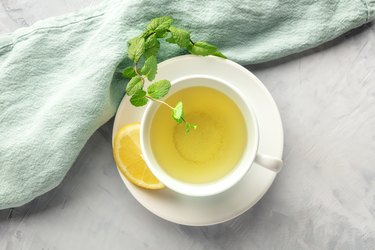
If you enjoy sipping a cup of green tea you may be enjoying some health benefits too. When you combine green tea with lemon, the benefits can be even greater.
Although there can be green tea side effects, it's worthwhile to examine green tea ingredients and consider incorporating it into your diet. The side effects are easy to identify.
Video of the Day
Video of the Day
Green Tea Ingredients
Green tea may encourage the growth of good gut bacteria, helping to stave off obesity, according to May 2019 animal research published in the Journal of Nutritional Biochemistry.
Green tea ingredients also include catechins and epicatechins, which belong to a group of plant compounds called flavonoids, explains Harvard Health Publishing. These compounds may provide antioxidant and anti-inflammatory protection, along with a range of other health benefits.
Notably, the anti-inflammatory effects of green tea may reduce plaque buildup within arteries. A June 2018 study published in the Journal of the American Heart Association found that tea appears to slow age-related decreases in high-density lipoprotein (HDL) cholesterol. Both green and black tea contributed to slower HDL declines, with green tea showing a slightly stronger effect.
Among the 80,000 survey participants, who were living in China, the link between green tea and slower HDL declines was most pronounced in people over age 60. These participants also had greater heart disease risk factors, such as tobacco use, a higher body mass index and more-sedentary lifestyles.
The results of this study are not conclusive, the AHA explains. Findings were based on self-reported data about weekly or monthly tea consumption. They didn't account for quantity — that is, drinking one cup of tea per day versus two or more — or the type of diet eaten by participants. Given the study's limitations, more research into green tea's effects on HDL may be needed.
Read more: The Best Green Tea to Lose Weight
Green Tea with Lemon Benefits
According to a November 2014 review published in the Journal of Food Processing and Technology, citrus juice brings out green tea's antioxidants. These antioxidants are then more readily available for absorption by the body.
Lemon juice can increase the number of catechins the body extracts from green tea by up to six times, the review states. Furthermore, whereas tea alone may inhibit iron absorption from foods, drinking green tea with lemon reduces that effect.
Lemon juice offers numerous health benefits of its own, as well. The Texas A&M University Health Science Center notes that the high acid content of lemons stimulates the production of hydrochloric acid, improving digestion. Lemon also slows the absorption of food, so your body can better break down the nutrients it needs.
Lemons are high in vitamin C, an antioxidant that improves your immune system, reduces inflammation and may help stave off common colds. Other compounds like folic acid, vitamin B and the minerals in lemons give your skin and hair a healthy boost. Hydrating and energizing, lemons can give you a natural kick to start your day.
Green Tea Side Effects
Harvard advises drinking tea in moderation to avoid any green tea side effects. Although a cup or two a day may provide some benefits, excessive consumption may be harmful.
Green tea contains the stimulant caffeine — about 25 to 29 milligrams for in every 8 ounces, according to the Mayo Clinic. Keep caffeine consumption under 400 milligrams a day to avoid headaches, restlessness, sleeplessness, anxiety and other negative health outcomes.
Cancer Research UK also notes that green tea contains epigallocatechin gallate (EGCG), a catechin that can cause stomach upset if taken in large quantities. Excess EGCG can also be toxic and damaging to the liver. Likewise, the oxalates in tea can cause kidney stones, according to the University of Chicago.
If you have any health conditions, check with your doctor about any contraindications before drinking green tea with lemon. If you take any medications, herbs or supplements, you'll want to determine whether green tea can help or harm your health.
- MedlinePlus: "Vitamin C"
- Harvard Health Publishing: "Flavonoids: The Secret to Health Benefits of Drinking Black and Green Tea?"
- Journal of Food Processing and Technology: "Nutraceutical Properties of the Green Tea Polyphenols"
- Texas A&M University Health Science Center: "The Health Benefits of Lemon"
- Journal of the American Heart Association: "Tea Consumption and Longitudinal Change in High‐Density Lipoprotein Cholesterol Concentration in Chinese Adults"
- American Heart Association: "Regular Tea Drinking Might Help Your Heart as You Age, Study Suggests"
- Mayo Clinic: "Caffeine Content for Coffee, Tea, Soda and More"
- Cancer Research UK: "Green Tea (Chinese Tea)"
- University of Chicago: "How To Eat a Low Oxalate Diet"
- Journal of Nutritional Biochemistry: "Green Tea Extract Prevents Obesity in Male Mice by Alleviating Gut Dysbiosis in Association With Improved Intestinal Barrier Function That Limits Endotoxin Translocation and Adipose Inflammation"